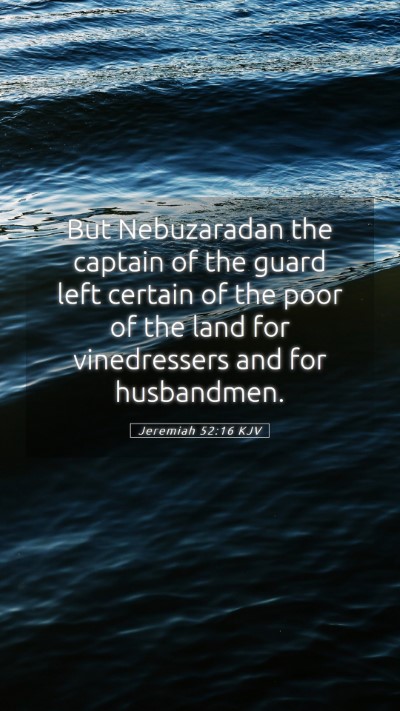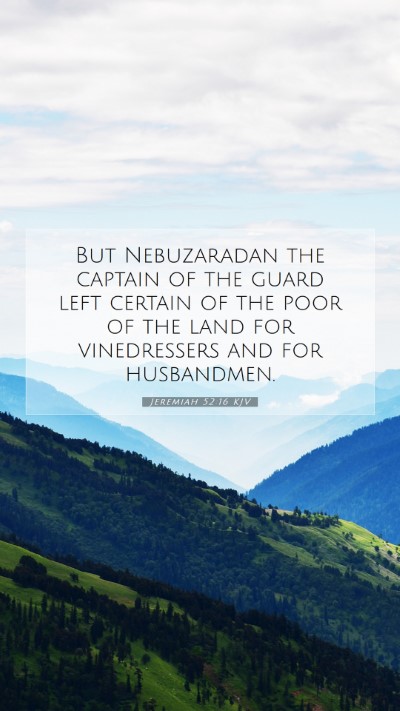Understanding Jeremiah 52:16
Jeremiah 52:16 states: “But Nebuzaradan the captain of the guard left of the poor of the people, which had nothing, in the land of Judah, and gave them vineyards and fields at the same time.” This verse provides critical insight into the aftermath of the Babylonian conquest of Jerusalem, highlighting God's overarching providence and mercy amidst judgment.
Bible Verse Meanings
The significance of this verse lies in its portrayal of the fate of Jerusalem's inhabitants after the city's fall. Despite the destruction and desolation brought by the Babylonians, there remains a remnant – the poor and marginalized – who are granted sustenance and a measure of hope. This section will explore various perspectives on the meaning of this scripture.
Insights from Public Domain Commentaries
-
Matthew Henry's Commentary:
Henry emphasizes the mercy God shows even in judgment. The captives, though poor and seemingly insignificant, are preserved and provided for. This indicates that even in desperate times, God remembers His people and provides for their needs. Henry categorizes this act as a fulfillment of God's promises to preserve a remnant.
-
Albert Barnes' Notes:
Barnes explains that the intervention of Nebuzaradan serves to illustrate the providential care in maintaining a portion of the population. He suggests that the 'poor of the people' are indicative of God's consideration for the humble and lowly. They become symbols of hope for future restoration, reflecting themes of grace through adversity.
-
Adam Clarke's Commentary:
Clarke provides a detailed analysis that situates this narrative within the broader context of prophecy and fulfillment. He notes that the poor remaining in the land symbolize the potential for a future rebuilding of Israel. Clarke also highlights the importance of land and agriculture in ancient Israelite society, suggesting that the allocation of vineyards and fields signifies a brighter future.
Bible Verse Interpretations
This verse serves multiple interpretive lenses. Below are some interpretations drawn from the insights above:
-
Mercy in Judgment:
Even amidst the dire circumstances of defeat, God's mercy emerges through the preservation of the poor, suggesting a tender character of God who caters to the needs of the vulnerable.
-
Hope for Restoration:
The provision of vineyards and fields illustrates God’s intention to restore His people—not just spiritually, but also materially, indicating a future where they can thrive again.
-
Significance of the Poor:
This verse underscores that in biblical narratives, the poor often hold a significant role. Their
experience serves as a reflection of God’s heart for the marginalized in society.
Scripture Analysis
When performing a thorough bible study, it is crucial to consider the historical context and the overarching narrative of Israel’s trials and triumphs. A focus on Jeremiah, as God’s prophet during tumultuous times, reveals the patterns of disobedience and grace.
Historical Context
This passage is set against the backdrop of the Babylonian Exile, where many think God abandoned His people due to their persistent rebellion. The outcome for the poor in Jeremiah 52:16 acts as a counter-narrative, promoting the idea that divine mercy prevails even in the bleakest of circumstances.
Related Bible Cross References
- 2 Kings 25:12: Highlights the action taken by Nebuzaradan regarding the poor.
- Isaiah 41:17-20: Discusses God’s provision for the needy and poor.
- Lamentations 3:22-23: Emphasizes God’s faithfulness and mercy amidst suffering.
Applying Bible Verses to Daily Life
Jeremiah 52:16 serves as a reminder that even when facing hardships, God has not forgotten His people. For those involved in bible study groups or online Bible study, this verse offers rich opportunities for discussion on God’s character, human suffering, and the hope offered through faith.
Practical Applications
- Encouragement to the marginalized: Remind those who feel neglected that they are valued.
- Hope in difficult times: Reflect on God’s past provisions as a source of hope for current struggles.
- Community support: Foster a spirit of sharing and support within your community.
Conclusion
In conclusion, Jeremiah 52:16 encapsulates profound themes of divine mercy, hope, and the significance of the marginalized. As highlighted by the commentaries of Matthew Henry, Albert Barnes, and Adam Clarke, this verse enriches our Bible verse interpretations and enhances our Bible study insights. It pushes us to understand scripture in a holistic manner, thus deepening our Bible verse understanding.


